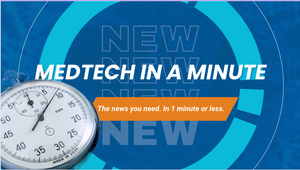Digital Health Firm Debuts Automated AFib Detector
August 26, 2014
Smartphone-based ECG firm AliveCor (San Francisco, CA) has announced the debut of an algorithm-based atrial fibrillation detector (AFib) after FDA cleared the technology. The new atrial fibrillation (afib) detector is a cloud-based system that can provide a warning to users when abnormal heart activity is detected. The algorithm gives patients near-instant results they can convey to their physicians to possibly prevent a stroke.
AliveCor plans to incorporate the algorithm into its app and make it available to customers in September, according to a statement by the company. The monitor is compatible with recent iPhone models and most Android mobile devices, the company said.
The San Francisco company said its new algorithm instantly detects whether patients are experiencing atrial fibrillation through real-time ECG recordings taken by its mobile phone-based heart monitor. The device stores and transmits ECG results to physicians, who can intervene before potentially life-threatening conditions, such as strokes, occur. AliveCor offers an ECG analysis service so patients can confirm their results with their cardiologist or personal physician.

Users have the option of having the abnormal ECG interpreted by a board-certified cardiologist. The device can send the ECG data to a clinic based in Los Angeles for that service, which can provide an interpretation within 24 hours for a fee of $12.
The company has been gradually increasing the palette of features offered by its technology as well as the size of its user base.
Late last year, the company debuted AliveInsights, a fee-based ECG review service for its heart monitors by cardiologists or cardiac technicians.
AliveCor's ECG technology was first available only to clinicians, but then later was made available via a prescription, and, earlier this year, over-the counter.
The heart monitor is available in the United States, the United Kingdom, and Ireland.
Mounted on the smartphone, the monitor formerly only transmitted ECG readings to a cardiologist or cardiac technician, who would return results within 24 hours. Now patients will receive instant results that they can transmit to a cardiologist for confirmation. The company said the algorithm never delivers false negative results, but may indicate false positives about 3% of the time.
Patients rest the AliveCor monitor against their fingers or chest to record an ECG. The monitor converts electrical impulses from the patient's fingertips into ultrasound signals transmitted by the device's microphone. The company's app sends the results to a physician.
Many people over age 40 have no symptoms of atrial fibrillation, an irregular and often rapid heartbeat that commonly causes poor blood flow to the body, according to the Mayo Clinic. Symptoms often include heart palpitations, shortness of breath and weakness.
Although atrial fibrillation is not typically life-threatening, it can cause blood clots to form in the heart and possibly move to other parts of the body, restricting blood flow.
Refresh your medical device industry knowledge at MEDevice San Diego, September 10-11, 2014. |
Nancy Crotti is a contributor to Qmed and MPMN.
Like what you're reading? Subscribe to our daily e-newsletter.
About the Author(s)
You May Also Like


